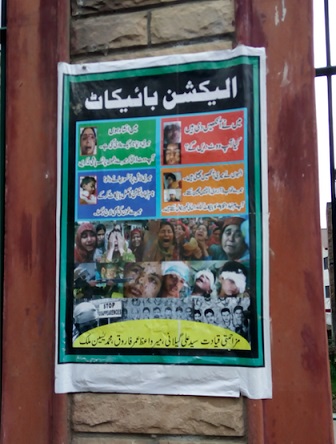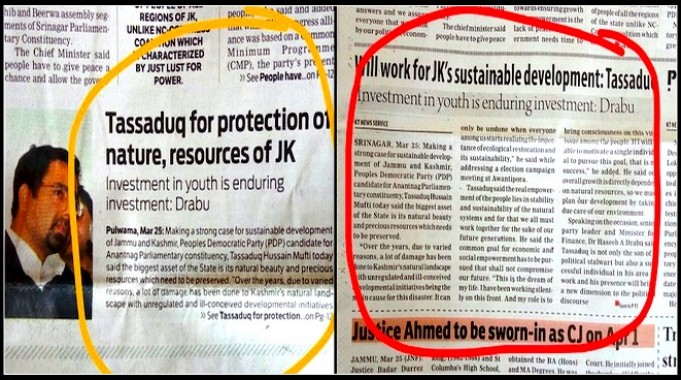Kashmir: the by-elections you haven’t heard about
Identical reporting in Greater Kashmir (left) and Kashmir Times (right).
This is almost a 'blink-and-miss’ it election campaign for the Srinagar and Anantnag parliamentary constituencies, a complete contrast to the intense, media-saturated blitzkrieg that elections have come to be in India.
With the shadow of last summer’s protests over the killing of Burhan Wani still looming large over the Valley and the call for an election boycott by the Hurriyat Conference, there have been no rallies, public meetings, door-to-door campaigns or any of the hurly burly of electioneering.
The National Conference leader, Farooq Abdullah, in an alliance with the Congress (I), is contesting the by-election to Srinagar against the People’s Democratic Party’s (PDP) Nazir Khan. The election was necessitated by the resignation of former PDP MP, Tariq Karra, after the protests last year and what he termed the failure of the government to address the hurt of the people. Karra subsequently joined the Congress but is not standing for elections.
In Anantnag, Tassaduq Mufti, brother of Mehbooba Mufti, who is better known as a cinematographer, is standing. The seat fell vacant after Mufti resigned to take over as chief minister of Jammu and Kashmir after the death of her father, Mufti Sayeed. In June 2016, Mufti won the seat by 12,000 votes. On July 8, Burhan Wani, the young Hizbul Mujahideen commander, was killed.
The silence on the street is a strange contrast to the media coverage in the local newspapers. As the date for the elections on April 9 approaches, the rather sluggish media coverage has picked up, with both Rising Kashmir and Kashmir Reader carrying several front-page reports.
Two weeks earlier, though, there were barely any reports, not even of the small, almost in-house, meetings addressed by Mufti or Abdullah. Interestingly, the first reports appeared on March 27, with rival newspapers carrying identical (almost word for word) stories on Mufti’s meeting on the front pages.
Why would they do that? Are they carrying agency reports and have forgotten to credit the agency? Don’t they have their own reporters to cover the news? Or, are they fed by the same political party’s PR machinery? None of the journalists this writer asked seemed to know or even care. That’s the way it is in Kashmir, one of them said, shrugging at the duplication of news in different newspapers.

A poster calling for an election boycott.
In any case, elections are not news here, despite Abdullah’s fervent pitch that the BJP’s recent win in assembly elections is an indication of tyranny and fascism that must be defeated. His appeal to the Jamait-e-Islami to support him in fighting the RSS raised eyebrows but the PDP message, reiterated by Mufti and her brother, Tassaduq, that the youth are misguided and need help, hardly helps matters either.
In the cirumstances, the campaigning has been confined to small group meetings. There was some sign of the hustings at the Hazratbal shrine when Abdullah came there on March 31 to address a meeting. The report made it to page 1 on Rising Kashmir and Kashmir Times and page 3 in Kashmir Reader.
But, as he came out with more attacking statements in his subsequent meetings, Abdullah began making the lead story in all the newspapers. Another front page story was the local Congress party accusation that the PDP mobilized workers from various government departments, including anganwadi and forest workers, for election rallies addressed by Mufti.
Of boycotts and graffiti voices
Everyone tells you that the turnout will be low, that people are still angry at Burhan Wani’s killing, and that anguish over the plight of the pellet victims remains unassuaged. Over the long years of the conflict, almost every family has a story of a family member who was killed or injured or was disappeared and every recent cycle only adds to the woe.
The only group that has made any noise at all has been the Hurriyat Conference with its demand for a poll boycott. The joint resistance leadership of Syed Ali Geelani, Mirwaiz Omer Farooq and Mohammad Yasin Malik had already successfully imposed a hartal on the day Prime Minister Narendra Modi came to Jammu to inaugurate the Chenani-Nashri tunnel and have now called for another shutdown on polling day on April 9.
In the absence of any other voice, it’s the graffiti and posters pasted on the walls and closed shutters of shops in the bylanes of Srinagar and other towns that speak up. Near the Jama Masjid in Srinagar, pictures of pellet victims, urging people to boycott the elections in memory of those who those blinded by pellets in last year’s protests, are up.
‘Boycott election’ graffiti is everywhere, along with older graffiti proclaiming Wani as a hero or proclaiming freedom for Kashmir. There are other blunt reminders of the anger against India: ‘Indian dogs, go back’ or ‘India, go back’ and a rejection of Modi’s call for tourism in the Valley: ‘Kashmir is not a park of India’!
Even the Election Commission’s valiant erection of a hoarding to get people to vote for democracy-right in the middle of Srinagar-has come a cropper. It has been torn out and its ragged bits flutter in the storm that has been lashing the Valley two days.
In the current political ‘’climate’’, maybe it will be the climate itself – the threat of unseasonal rain and of floods – that will be more decisive than the candidates.







